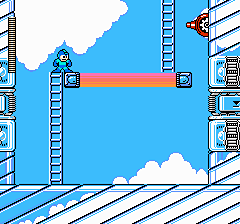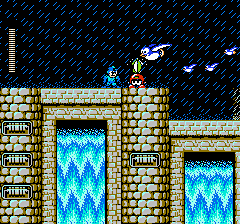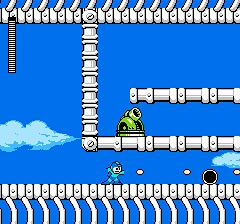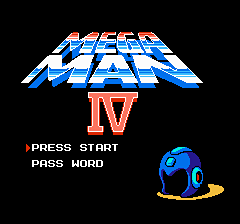
Mega Man 4 (1992-)
Developer: Capcom
Publisher: Capcom
Genre: Platform
Mega Man 4 is a platform action game developed and published by Capcom for the Nintendo Entertainment System, released in 1991 in Japan and later in North America. It is the fourth entry in the Mega Man series and continues the storyline established in previous games, following Mega Man as he battles the recurring villain Dr. Wily. The game was later re-released in several compilation collections, including the PlayStation’s Mega Man Anniversary Collection and digital releases on modern platforms, allowing new players to experience this NES classic. Mega Man 4 was inspired by the ongoing popularity of the series, with the developers aiming to introduce new gameplay mechanics and expand the strategic possibilities that had become a hallmark of the franchise.
In Mega Man 4, players navigate Mega Man through eight themed stages, each controlled by a Robot Master with its own unique design, enemies, and platforming challenges. A significant new feature introduced in this installment is the “charge shot,” which allows Mega Man to hold down the fire button to release a more powerful, charged attack, adding a strategic layer to combat. The traditional mechanic of acquiring defeated Robot Masters’ weapons remains central, encouraging players to experiment with different strategies to exploit enemy weaknesses. Levels include a mix of precise jumping sequences, timed hazards, and enemy patterns that test both skill and planning, maintaining the series’ reputation for challenging yet rewarding gameplay.
The soundtrack of Mega Man 4 continues the series’ tradition of memorable and energetic compositions, with each Robot Master stage featuring a distinctive theme that reflects its environment and personality. The music drives the pace of the action while giving each level a recognizable identity, enhancing the player’s immersion in the game world. Sound effects are carefully designed to provide responsive feedback for jumping, shooting, and using the new charge shot, contributing to the satisfying gameplay experience. The combination of music and sound reinforces the sense of urgency and excitement that defines the Mega Man series.
Mega Man 4 was promoted as a continuation and refinement of the highly successful Mega Man franchise, emphasizing the introduction of the charge shot and the expanded level designs. Upon release, it received positive reception for its engaging gameplay, creative stage design, and challenging difficulty, though some critics noted that it closely followed the formula of its predecessors. The success of Mega Man 4 paved the way for Mega Man 5 and subsequent sequels, securing the series’ place as a cornerstone of NES platform gaming. Over time, the game has appeared in multiple compilation releases, ensuring that it remains accessible to fans and preserving its status as a beloved classic in the Mega Man series.
Images from MobyGames
Buy Mega Man 4
Click one of the Ebay or Amazon buttons below to check the latest prices and purchase Mega Man 4 for the Nintendo Entertainment System.

Related Searches
Mega Man 4 NES Download
Mega Man 4 is available to purchase and download from a range of vendors. Always shop around...
Mega Man 4 NES Manual
Various repositories around the internet have scanned and archived a range of retro manuals. Search now to.....
Mega Man 4 NES Rom
We don't host or link to rom sites for this game. However, there are many sites out there that may be...
Mega Man 4 NES Walkthrough
Many sites - particularly YouTube - host a range of walkthrough videos to guide you in your quest to get...
Mega Man 4 NES Cheats
There are various sites out there that can offer cheat codes for games. Search now to find all available...
Mega Man 4 NES Controls
This information can often be obtained through the user manual. Alternatively there are many sites out there...
Mega Man 4 NES Release Date
The initial release date for Mega Man 4 is stated as January 1992. Other ports of the game may..
Mega Man 4 NES Review
There are many sites out there that have collated and documented historic reviews of this game. Search now...
Mega Man 4 Famicom
As a Nintendo Entertainment System release, this game was also likely also available on the Famicom. This....
Mega Man 4 NES Speedrun
There is now a community of competitive speedrunners who will try and gain the fastest possible time on their....








